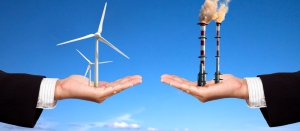The Fossil Fuel vs. Renewable Energies: The Transition Dilemma by Sara, Morocco
The call of a full worldwide energy transition model is getting louder each day. The planet is on the edge of destruction, in fact, according to the recent CFCCC report; we do not have enough time to save the planet if we do not act quickly and efficiently. Climate change does not stop at the borders so nor should the solutions be.
In Morocco, the call of a change is pressuring officials to evaluate the situation and act quickly. In fact, Morocco is one of the countries that are investing in renewable energies. However, fossil fuel power plants still mainly provide Morocco’s domestic energy demand. Fossil fuels represent about 68% of the installed capacity in Morocco. The remaining 32% comes from renewable energy sources (hydroelectric, wind and solar). The country seeks to meet the growing demand for energy while reducing imports through the exploitation of renewable resources by 2020.

Despite the international momentum in the fight against climate change, fossil energies are always capturing global investment. African countries are continuing to distribute fossil fuel subsidies. In fact, between January 2016 and December 2018, global banks have spent no less than 1,688 billion euros in the fossil fuel sector. The United States banks are the most dynamic in investing in the fossil fuel sector, they did invest 690 billion euros in comparison to their European counterparts with 449 billion euros of investments.
These investments are justified in the name of development, employment, the competitiveness of companies consuming electricity or the fight against fuel poverty, according to the Climate Change report.
In Morocco, despite the national green strategy, Oil and Gas are still a promising field of investment. In the recent second Moroccan Oil and Gas Summit, which was held on February 2019 by ONHYM in Marrakesh; Amina Benkhadra the head of ONHYM and her team were hopeful about the investments in the exploration of oil and gas deposits in the kingdom. According to her: We are not expecting immediately a doubling of investments like what happened between 2017 and 2018, where the amounts invested rose from 1.27 billion dirhams to 2.5 billion dirhams, but at least one slight increase in 2019”.
Since 2000, 52 wells have been drilled, resulting in 33 commercial discoveries. The medium to small discoveries to date have proven to be very profitable due to the extensive pipeline network and strong local industrial demand, including the automotive and building materials industries. New locations are scheduled in the future years; the region of Tendrara, which is located in the northeast of Morocco, is a new hydrocarbon exploration site in Morocco and set to be functional by 2021.
Morocco is still interested in new heavy work in the sector of oil and gas. In fact, following extensive exploration by ONHYM and its partners Sound Energy and Schlumberger, particularly the drilling of three wells between 2016 and 2017, a concession of production was awarded to Sound Energy and Schlumberger in August 2018 for the development and production of the gas field. The appropriate infrastructure is planned for 2019-2021 and the production for 2021.
The Mediterranean region is still poorly explored; very few drilling has been done in this place for the exploration of hydrocarbons in Morocco. This area has not yet revealed its potential with only 2 wells and 10,000 km² of 2D seismic. It should be noted that, to date, 70 research permits and 10 operating concessions have been awarded to international oil companies. A total of 351 exploration wells were drilled in the kingdom.
Fossil fuel sector is still with a high value not only for Morocco but for Africa as well. In 2017, Morocco and Nigeria did sign for a challenging project with an investment cost of 20 billion dollars. The Morocco Nigeria pipeline is set to enhance the acceleration of electrification projects in West Africa.
Various voices are calling for the immediate stop of investments in the fossil fuel sector, according to Rachid Ennassiri, a young Moroccan activist on climate action, renewable energies and energy efficiency, the Secretary-General of the Moroccan Youth Center for Sustainable Energy (CJMED).
While the acceleration of global warming exceeds all expectations and greenhouse gas emissions have set a new record in 2016, the construction of this pipeline can only go in the direction of an increase in the extraction and rising consumption of natural resources, the main cause of global warming. Contrary to what is often asserted, gas is not a clean energy. The methane it contains is much more volatile than CO2 and considerably more powerful in global warming potential. However, the concentration of methane in the atmosphere has accelerated dangerously since 2007.
The Moroccan-Nigerian project is serving multinationals. Oil exploitation in Nigeria has not enriched Nigerians. While Nigeria ranks 20th in the world rankings relative to its GDP, more than 60% of the population lives below the poverty line and life expectancy does not exceed 53 years. In contrast, foreign investors repatriated more than US $ 12.7 billion in 2015 alone.





Leave a Comment
Want to join the discussion? Feel free to contribute!